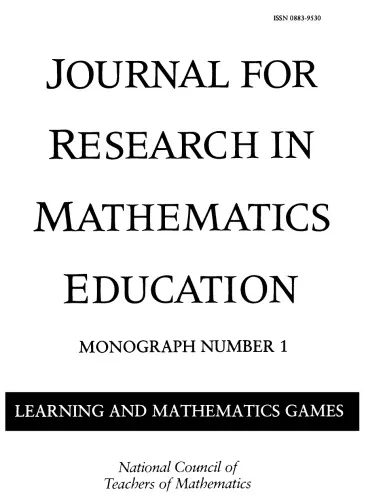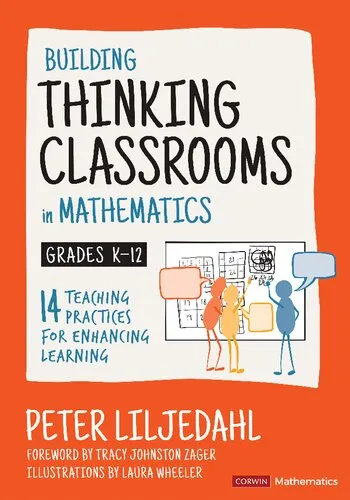Learning and Mathematics Games (Journal for Research in Mathematics Education. Monograph, No. 1)
3.8
Reviews from our users

You Can Ask your questions from this book's AI after Login
Each download or ask from book AI costs 2 points. To earn more free points, please visit the Points Guide Page and complete some valuable actions.Related Refrences:
Introduction to Learning and Mathematics Games (Journal for Research in Mathematics Education. Monograph, No. 1)
Welcome to the exploration of an invaluable resource for educators, researchers, and practitioners interested in using mathematics games as a powerful tool for learning. Learning and Mathematics Games, published as the first monograph in the Journal for Research in Mathematics Education series, stands as a groundbreaking contribution to understanding the interplay between game-based learning and mathematical comprehension. Written by George W. Bright, John G. Harvey, and Margariete Wheeler, this book delves deeply into how mathematics games can support cognitive development, enhance engagement, and create meaningful contexts for learning.
The book is a masterfully compiled analysis of the theoretical frameworks, empirical studies, and practical strategies that justify the use of games in mathematics classrooms. Through a blend of research-driven insights and actionable recommendations, it bridges the gap between pedagogy and practice. Whether you are an educator striving to integrate innovative teaching methods or a researcher examining the learning affordances of games, this monograph provides comprehensive perspectives that are both relevant and transformative.
Detailed Summary of the Book
Learning and Mathematics Games is structured to provide an extensive discussion that encompasses both theoretical and practical dimensions of mathematics games in education. The book begins with an overview of the historical context of games in mathematics education, tracing the roots of their pedagogical use and analyzing their evolution over time. Key research studies that provide the foundation for integrating games into mathematical instruction are presented, highlighting the evidence-based benefits such as improved problem-solving skills, increased motivation, and deeper conceptual understanding.
The authors explore a variety of mathematics games across different grade levels, explaining how these games align with curricular goals and learning outcomes. From board games to digital platforms, the monograph meticulously examines the characteristics that make a game effective—such as challenge, feedback, and adaptability—providing a blueprint for designing or choosing games for instruction. Additionally, the book addresses potential challenges, such as balancing entertainment and educational value, ensuring equitable access, and assessing learning gains through gameplay.
The final chapters shift focus towards practical implementation strategies, offering a step-by-step guide on embedding games into lesson plans and classroom activities. The book emphasizes teacher training and preparation, discussing how educators can leverage games not just as supplementary tools, but as core components of an enriched learning experience. Each chapter is enriched with case studies, enriched diagrams to clarify theoretical constructs, and suggested games that exemplify best practices.
Key Takeaways
- Mathematics games are more than mere entertainment; they are tools for active learning that promote engagement and mastery of concepts.
- Effective integration of games requires alignment with curriculum objectives and careful planning by educators.
- Playing mathematics games can foster skills such as critical thinking, strategic reasoning, and collaborative problem-solving.
- Research underscores the cognitive and emotional benefits of game-based learning, particularly its ability to reduce math anxiety and build confidence among learners.
- The success of implementing mathematics games in classrooms depends largely on teacher readiness and the availability of resources.
"Games are not a distraction from learning; they are a medium through which learning becomes intrinsic."
"In mathematics education, engagement precedes mastery, and games provide the entry point for meaningful engagement."
Why This Book Matters
In an era where students increasingly demand interactivity and relevance in their learning experiences, Learning and Mathematics Games offers a timely and critical perspective. Mathematics education often grapples with issues such as disengagement, math anxiety, and a perceived lack of real-world application. This book provides a pathway to reinvigorate how educators approach these challenges by integrating games into instruction.
Furthermore, this monograph is not just for educators but also for policymakers, curriculum developers, and researchers. It lays a solid foundation for further exploration of game-based learning, addressing both its promises and its limitations. The authors weave together research and practicality in a manner that is accessible and compelling, making the book a valuable resource for fostering mathematical literacy and lifelong interest in the subject.
Free Direct Download
You Can Download this book after Login
Accessing books through legal platforms and public libraries not only supports the rights of authors and publishers but also contributes to the sustainability of reading culture. Before downloading, please take a moment to consider these options.
Find this book on other platforms:
WorldCat helps you find books in libraries worldwide.
See ratings, reviews, and discussions on Goodreads.
Find and buy rare or used books on AbeBooks.
1444
بازدید3.8
امتیاز0
نظر98%
رضایتReviews:
3.8
Based on 0 users review
Questions & Answers
Ask questions about this book or help others by answering
No questions yet. Be the first to ask!









